Access the OPR's planning performance output (including all reports, case study papers, practice notes and practice applications)
Search
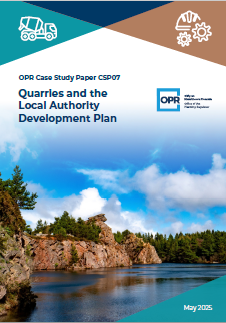
OPR- Quarries and the Local Authority Development Plan
This Case Study Paper (CSP07) is the seventh in a series of OPR Case Study Papers. It focuses on ‘Quarries and the Local Authority Development Plan’.
This Case Study Paper was identified as a ‘Strand Two - Planning Performance’ project in the OPR’s Strategic Planning Research Programme 2023 – 2025.
The planning system plays a key role in the management of natural resources and the protection of natural and cultural heritage. This role was recognised in the Ministerial Guidelines for Planning Authorities on Quarries and Ancillary Activities which were published in 2004. As the planning system embarks on further reform this case study paper provides an overview of how planning authorities have addressed the guidelines and the extractive industry sector in general. Drawing on the lessons, observations and key findings of this research a number of conclusions were identified which highlight the unique opportunities that currently exist with emerging changes to the planning system and other tandem policy areas. These findings include a need to:
- Revise and update the Ministerial Guidelines for Planning Authorities on Quarries and Ancillary Activities;
- Consider the location of aggregate reserves/existing quarries in the review of Rural Housing Guidelines;
- Establish a national register of extractive industries in Ireland;
- Develop a national prediction system for aggregate supply and demand;
- Develop a national policy statement on marine aggregates;
- Enhance the role of regional assemblies in the extractive industry;
- Implement Section 256 of the Planning and Development Act 2024 to establish designated regional enforcement authorities;
- Include quarry data in development plans; and
- Deliver training for local authority and regional assembly staff.
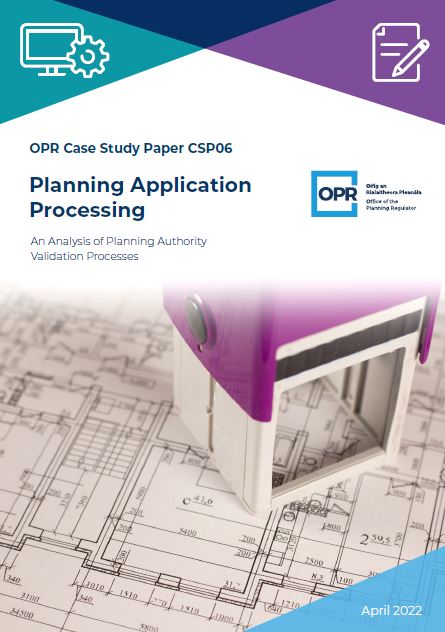
OPR- Planning Application Processing- An Analysis of Planning Authority Validation Processes
This
Case Study Paper (CSP06) is the sixth in a series of OPR Case Study
Papers. It focuses on ‘Planning
Application Processing: An
Analysis of Planning Authority Validation Processes’.
This case study paper explores how local authorities validate planning
applications. The validation of a planning application involves an assessment
of the documentation submitted by an applicant to determine if it complies with
regulatory requirements.
In preparing this CSP a high level review of the available validation statistics for all 31 planning authorities over the period 2016-2020 was carried out. Eight local authorities were then identified, from within three validation bands (below average, average and high invalidation rates). Consultation took place with staff from the eight selected local authorities to better understand the systems and procedures that are used to validate planning applications.
The aim of CSP06 is to share learnings and good practice and to stimulate thinking on how to achieve a situation where the majority of planning applications that are lodged are valid on receipt. By the dissemination of information about systems and procedures the aim is to help planning authorities to develop good practice approaches and to improve consistency and efficiency in the validation of planning applications.
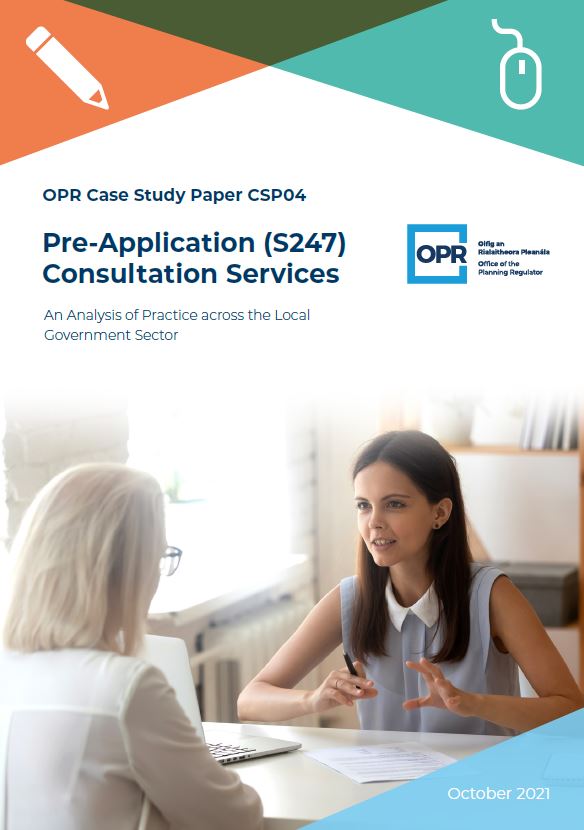
OPR- Pre-Application (S247) Consultation Services- An Analysis of Practice across the Local Government Sector
This Case Study Paper (CSP04) is the fourth in a series of OPR Case Study Papers. It focuses on 'Pre-Application (S247) Consultation Services: An Analysis of Practice Across the Local Government Sector'. It builds on CSP02 'Online Planning Services: A Survey of the Online Availability of Local Authority Planning Documentation' which found there was a variation in how pre-application services are delivered across local authorities. This CSP explores how the service is delivered across all 31 local authorities.
In preparing the CSP, we consulted with each local authority to understand how they deliver the pre-application consultation service. Following this consultation we were able to identify the different systems and procedures employed by local authorities in their delivery of this service. In the CSP we have set out the characteristics of good quality pre-application consultation systems and we have proposed seven guiding principles that could be used by local authorities for self-assessment.
The aim of CSP04 is to support planning authorities in the delivery of Pre-Application (S247) Consultation Services and to promote greater exchange of knowledge and expertise across the sector. CSP04 also seeks to encourage greater harmonisation in the delivery of this service across local authorities.
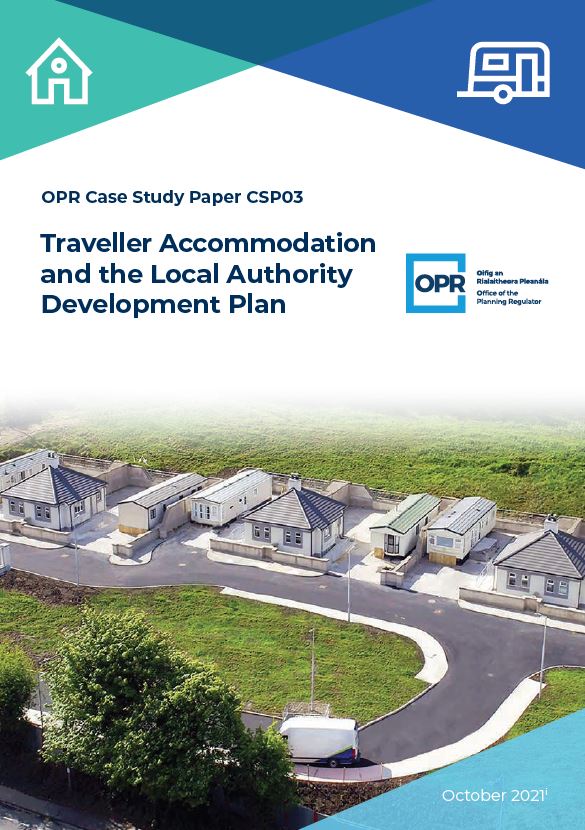
OPR- Traveller Accommodation and the Local Authority Development Plan
This Case Study Paper (CSP03) is the third in a series of OPR Case Study Papers. It focuses on 'Traveller Accommodation and the Local Authority Development Plan'.
A Traveller Accommodation Expert Group, established by the government in 2018, carried out a review of the effectiveness of the Housing (Traveller Accommodation) Act, 1998. In July 2019, this Expert Group published a report which called upon the OPR to research and review "Traveller accommodation policies and objectives in statutory development plans."
This CSP was based on a survey of current development plans and Traveller accommodation programmes and examined linkages between their policies and objectives. This CSP seeks to support planning authorities in the performance of their duties and to highlight best practice and promote shared learnings across the sector.
.jpg)
OPR- Online Planning Services- A Survey of the Online Availability of Local Authority Planning Application Documentation
This Case Study Paper (CSP02) is the second in a series of OPR Case Study Papers. It focuses on 'Online Planning Services: A Survey of the Online Availability of Local Authority Planning Application Documentation'.
The availability of online planning services and the accessibility of planning application documentation on local authority websites has been a particular focus of public and stakeholder attention recently. The restrictions associated with the Covid-19 pandemic emphasised the need to provide the public with adequate remote access to planning services, including viewing planning applications online.
This CSP was based on a survey of over 155 randomly selected planning applications on the websites of all 31 local authorities. The CSP seeks to support planning authorities in the delivery of online planning services, to highlight best practice and promote shared learnings across the sector.
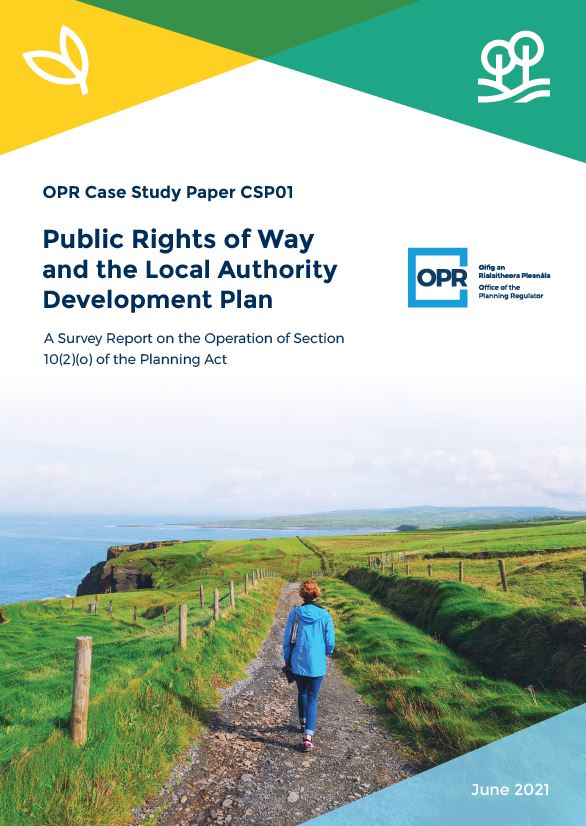
OPR- Public Rights of Way and the Local Authority Development Plan
This Case Study Paper (CSP01) is the first in a series of OPR Case Study Papers. It focuses on 'Public Rights of Way and the Local Development Plan: A Survey Report on the Operation of Section 10(2)(o) of the Planning Act'.
Public Rights of Way (PROW) are an essential part of the amenity and recreational facilities available to the public in Ireland, whether they provide access to rivers, seashore, lakes, uplands or other amenities.
This CSP was based on analysis of the current public rights of way, findings from a survey of local authority development plans and it provides a good practice summary.
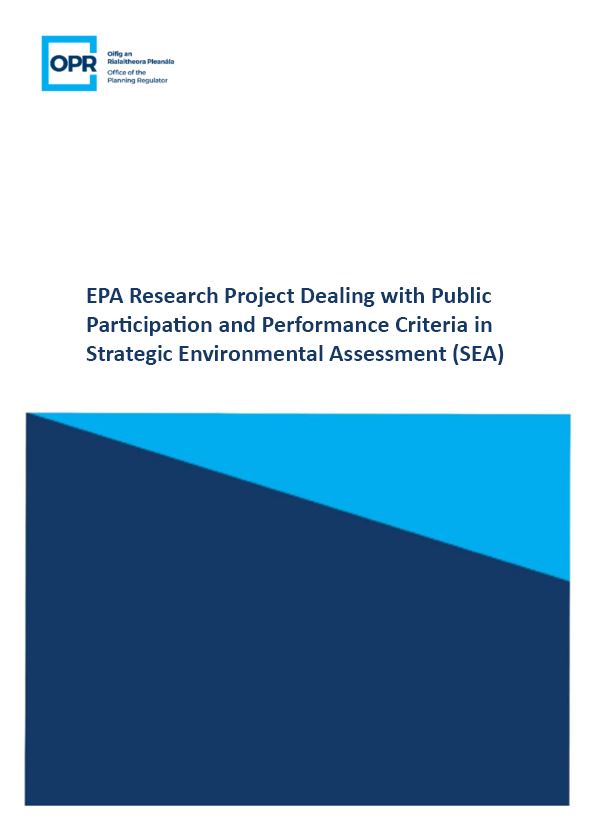
EPA- Research Project Dealing with Public Participation and Performance Criteria in Strategic Environmental Assessment (SEA)
The OPR entered into a co-funding agreement with the Environmental Protection Agency (EPA) in December 2021 in respect of a new research project entitled 'Public Participation and Performance Criteria in Strategic Environmental Assessment: The Way Forward to Advancing Practice' or the SEAWAY project.
The project commenced in March 2022 and is being led by Dr. Ainhoa González Del Campo, Associate Professor with the School of Geography in University College Dublin (UCD). The project duration is 24 months with an estimated completion date of March 2024.
The aim of the research is twofold:
-to review the extent and effectiveness of public participation in SEA practice and to enhance participation in Irish SEAs by developing a good practice guidance note and by producing a video describing how people can get involved in the process; and
-to review preliminary Key Performance Indicators (KPIs) for SEA in Ireland, and develop a robust performance framework and associated effective KPIs that will be tested in live SEAs within the project timeline.
The ultimate goal of the project is to improve public participation in SEA in Ireland and to provide a robust SEA performance evaluation framework and associated KPIs to facilitate performance checks during assessments. An online survey was undertaken in October/November 2022 and interviews with national and international experts were undertaken in Q1 2023. A demonstration pilot workshop was held in June 2023 in Dundalk, Co. Louth. The project is on target for completion by mid-2024.
In March 2024 the project team published a Guidance Note on Public Participation in SEA which can be found here.
Overall, the research outputs and outcomes will contribute to advancing the effectiveness of SEA in protecting the environment and promoting sustainable development.
For more information on the project you can access newsletters produced by the project team here and the video produced by the project team describing how people can get involved in the process is available here.
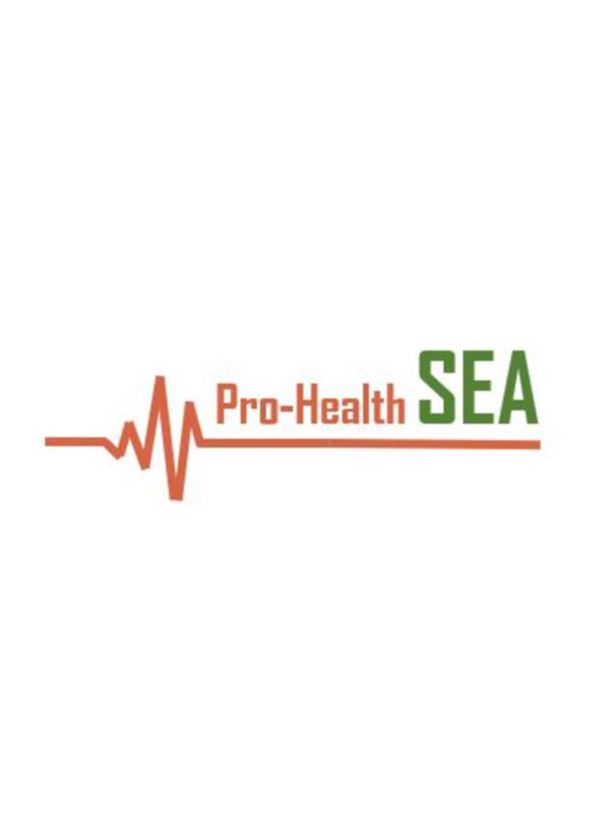
EPA - Pro-Health SEA Project - Toolkit for Proportionate and Consistent Consideration of Population and Human Health in Strategic Environmental Assessment
In May 2023 the OPR joined the Steering Committee of the Environmental Protection Agency (EPA) funded research project 'Pro-Health SEA'.
The aim of this project is to develop a toolkit for proportionate and consistent consideration of population and human health in Strategic Environmental Assessment (SEA). It is anticipated that this project will run until March 2025.
The project will entail the identification of good practice case studies and formulation of procedural and methodological recommendations to better consider population and human health in Strategic Environmental Assessment (SEA). The project toolkit will also provide the basis for developing a 'Good Practice Guidance for addressing health in SEA'.
For more information, please visit the project website here.
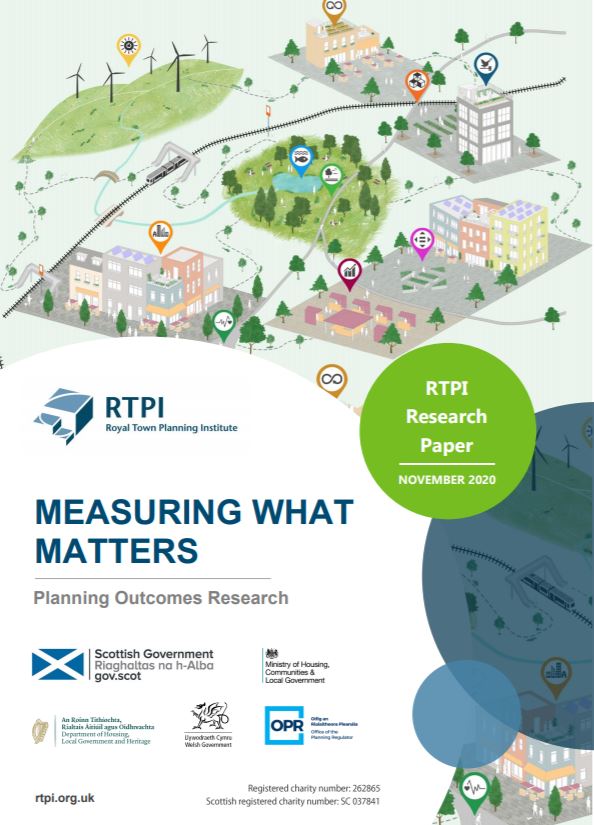
RTPI- Measuring What Matters- Planning Outcomes Research
This research considers how local authorities can measure the outcomes of planning. This means going beyond simple metrics like speed of processing applications and number of housing units delivered and assessing planning in terms of placemaking aspirations and social, economic and environmental value, in order to track and improve the impact of planning.
Building on previous work that has taken place across the nations, the research team reviewed the context and needs of planning jurisdictions across the UK and Ireland, identifying guiding principles, developing a toolkit and then contextualising, testing and refining that toolkit.
This research was commissioned by the Royal Town Planning Institute (RTPI) with funding support from the Governments of Ireland, Scotland and Wales, along with the Ministry of Housing, Communities and Local Government and the Office of the Planning Regulator in Ireland.
As a follow up to this research the OPR’s Strategic Planning Research Programme (SPRP) for 2023-2025 seeks to undertake further research on Development Plan Monitoring in Ireland [see Planning Practice page for updates on work on that theme].